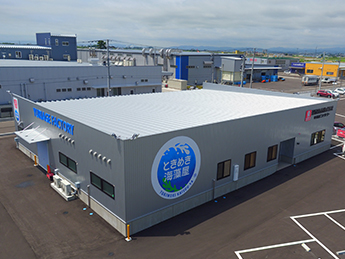Glossary
A
Application & Innovation Center (A&I Center)
An R&D facility for food improving agents. Located in our Chiba Factory, the Center is equipped with facilities for the manufacture and testing of various kinds of processed foods. Not only do we strive to provide solutions to challenges facing processed food manufacturers, but we also identify latent needs in advance, achieving value-added proposals that are “one step ahead of solutions.”
Application Center (APC)
An R&D facility for food improving agents. Located in Singapore, Shanghai and USA, they are equipped with facilities for the manufacture and testing of various kinds of processed foods. They coordinate with our Application & Innovation Center in Japan to propose new products and solutions to processed food manufacturers.
Agricultural film
These are films used for agricultural greenhouses. Our anti-fogging agent works to prevent film from clouding up. The addition of anti-fogging agent can prevent droplets from falling onto crops and causing disease. It can also allow more sunlight into the greenhouse so that vegetables and flowers can grow more robustly.
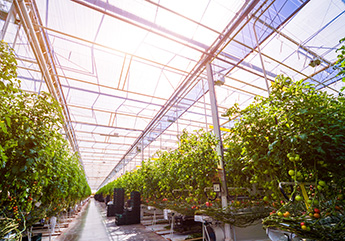
B
Biodegradable plastics
These are plastics which are broken down into carbon dioxide and water by microorganisms in the environment. We offer the plasticizer BIOCIZER® for biodegradable plastics.
*Plasticizers work to soften hard plastics. The use of plasticizer makes it possible to adjust the hardness of plastics to suit the purpose.
Biomass
It is a generic term for plant-based, renewable organic resources and generally excludes petroleum and other fossil fuels.
Our chemical improving agents are mostly made from plant-based materials such as palm oil. They are highly regarded for their sustainability and their safety for use in foods and on human skin.
BIOCIZER®
This is the product name of our chemical improving agent. Made primarily from plant-based oil, it is a plasticizer with high biomass content and has been certified for the Biomass Mark. The glycerol fatty acid ester component is listed in Japan's Specifications and Standards for Food Additives and complies with the food packaging regulations of various countries. The product is used worldwide as a highly safe plasticizer.
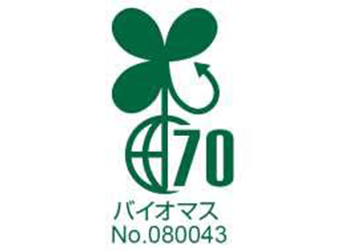
C
Crocetin
Crocetin is a colorant contained in gardenia fruit. Studies have shown it to be associated with better quality sleep and eye focus adjustment. We supply this product to health food manufacturers as an ingredient for their Foods with Function Claims.
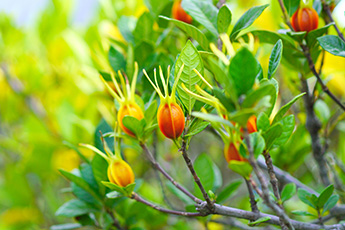
Cleansing Scrub
Cleansing scrub consists of tiny beads mixed in with cleaning agents for effective removal of dirt and grime. Microplastics are sometimes used for this purpose.
At Riken Vitamin, we offer plant-based cleansing scrub for use in facial cleansers. This environmentally conscious product has the potential to help prevent marine pollution by reducing the use of microplastics.
E
Egao de Lunch
This is a sweetener-free, seasoning-free (no amino acids or nucleic acids) dressing series developed in response to nutritionists’ requests for dressings which let children taste the natural flavors of foods. They are used mainly in school lunches.
We also operate a special website, “Egao de Lunch (Lunch with Smiles),” which networks with school lunch stakeholders nationwide through our nutritionists’ columns and school lunch recipes.
Extract
They are made primarily with extracts and seasoning blends made from agricultural, marine, and livestock products.
Some key products include scallop extract, oyster extract, fish sauce, bonito extract, bonito flake extract, other seafood extracts, beef extract, chicken extract, pork extract, and seasonings made from these extracts.
Emulsifier formulations
In our improving agent business, we refer to combinations of multiple improving agents or improving agents with other raw materials as emulsifier formulations to be distinguished from single emulsifiers. In emulsifier formations, the functionalities of the improving agents are enhanced even more than in single emulsifiers. They are provided as liquids, powders, or whatever form is easiest to use for the customer’s circumstances.
Extraction, refining, and concentration
These are the core technologies for our businesses. We extract useful substances from natural materials, then refine (remove or reduce diluting agents) and concentrate them to manufacture high-value-added products.
Emulsifer
Emulsifiers have a number of functions in addition to emulsification, including dispersion, foaming, and defoaming. They are used in food manufacturing processes and quality improvement. They are used in a wide range of processed foods, including bread, noodles, tofu, Japanese and western confectioneries, beverages, and processed fats.
F
Functional seasonings
These are seasonings which utilize our seasoning know-how and food improving agent technologies. Adding these to foods intensifies the natural flavors of the ingredients and imparts functionalities which are key to creating delicious tastes, such as the addition of body, achieving a simmered look/feel/taste, and masking of unpleasant odors. They are therefore used in a wide range of processed foods.
Foods with Function Claims
Under the Foods with Function Claims labeling system, a company is allowed to display functional claims on product labels by pre-marketing submission, to the Secretary-General of the Consumer Affairs Agency, of scientific data and other necessary documentation proving the safety and functionality of the food.
Feed oil
We offer oils for use in aquaculture feed. These are primarily made from oils obtained from sardines, mackerel, and other fish species caught in high volumes. These oils contain high levels of omega-3 and other highly unsaturated fatty acids and are added as an energy source to the feed for eel, yellowtail, sea bream, and other farmed fish.
Fueru Wakame-chan
This is our cut dried wakame for household use, launched in 1976. In addition to Sanriku Wakame, we also offer wakame from various regions with delicious differences in their texture profiles.
We have top domestic share of cut dried wakame production.

G
Geographical Origin Test Pass Logo
In order to ensure the quality of what we deliver to customers, we began to conduct scientific production site traceability tests for wakame in 2019. These tests check the veracity of the production sites identified by conventional traceability systems. We give our products the Geographical Origin Test Pass Logo if they satisfy both of these traceability systems.
Through these apploaches, we aim to improve the value of growing-area-specific wakame brands.
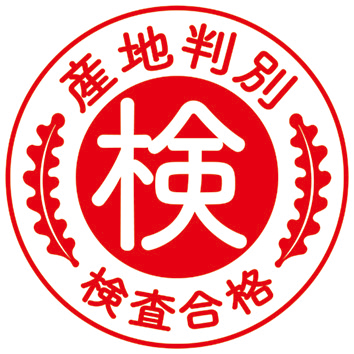
I
Improving agents
“Improving agents” is our generic term for products which impart functionality to foods and chemicals. Our improving agent business consists of our food improving agent business and our chemical improving agent business. In our food improving agent business, we mainly provide emulsifiers, colorants, and vitamins. In our chemical improving agent business, we provide a range of products applying our emulsifiers for foods to the chemical field. (Related topics: single emulsifier, emulsifier formulations)
J
Japanese Space Food
Japanese space foods were developed by the Japan Aerospace Exploration Agency (JAXA) for Japanese astronauts on the International Space Station (ISS) to help maintain and improve their performance while in orbit.
Our Wakame Soup was certified as a Japanese space food in 2007 and has been supplied to JAXA ever since. Wakame is rich in natural minerals and dietary fibers, and effective for supplying additional nutrition to astronauts staying in space for long periods.
Photograph: Japanese space food Wakame Soup (after adding hot water). It is packed in special materials to prevent the liquid content from splashing in microgravity.
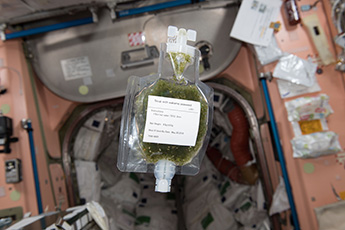
M
Molecular distillation
Distillation is a refinement and separation technique whereby a liquid is made to evaporate under specific conditions and the vapor is cooled to condense into liquid. Molecular distillation is performed under high vacuum with the evaporator and condenser surfaces close together. Distillation can be performed at low temperatures. This method is suitable for refinement and separation of substances which are heat unstable or have high boiling points.
Microcapsules (Trade name: Rikebeads)
Our microcapsules are 0.15 to 1mm in diameter, with the active ingredient dispersed evenly within a film made of gelatin, etc. With our exclusive technology, we can make strong capsules capable of being processed into tablets.
Bitterness of the active ingredient can be a problem in orally disintegrating tablets*. But microencapsulation of the active ingredient can mask the bitter taste.
*A convenient dosage form which dissolves quickly in the mouth and can be taken without water.

Master batch
Chemical improving agent formulated in plastic in high concentrations and processed into pellet form. By giving them the same shape as the plastic pellets which are common raw materials, we can facilitate the addition of chemical improving agents to plastics.
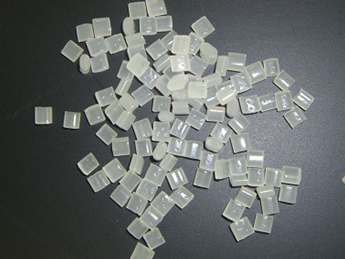
Mekabu fucoidan
This is the viscous component in “mekabu,” the sprouts at the base of wakame. Ingestion of mekabu fucoidan is believed to strengthen immune cells and boost immunity.
Monoclycerides
This is one of the emulsifiers we manufacture. It is made primarily by reacting edible oil with glycerol at high temperatures, and is refined by methods such as molecular distillation.
We have top domestic share of monoglycerides. Applying the molecular distillation technology we gained through vitamin A production, in 1959 we became the first in Japan to manufacture distilled monoglycerides. In 1966, we were honored to receive the 12th Okochi Memorial Production Award for the commercial production of distilled monoglycerides using domestic technology.
P
Palm oil
This is a plant-based oil obtained from the fruits of the oil palm. It is one of the primary ingredients of our improving agents (emulsifiers).
Presentation Center (PC)
This is a center for sharing food-related information, serving as the core of our food business’ recipe development and delivering smiles to customers through cooking. We serve our consumer-oriented (supermarkets, retailers) and industrial (school lunch providers, corporate canteens, restaurants) clients by providing menu ideas and suggesting ways to eat our products to maximize their benefits, thereby creating new settings around food.
R
Riken Salad Duo
This is an oil-based dressing series with an exciting twist to popular flavors.
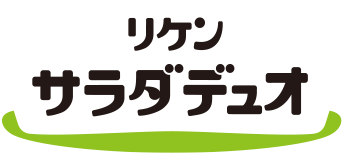
Riken Non-Oil
This is our varied lineup of healthy Non-Oil Dressings which includes our 30-year long-seller Riken Non-Oil Aojiso.
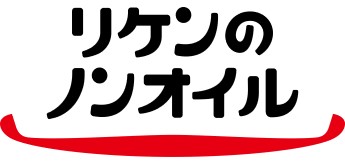
Riken Non-Oil Selecty
This is a Non-Oil Dressing series that bring out the natural goodness of the ingredients using our exclusive techniques.

S
Single emulsifier
In our improving agent business, we refer to single-ingredient improving agents with functionality as “single emulsifiers” to be distinguished from emulsifier formulations.
Sozairyoku Dashi
Our Sozairyoku Dashi is a soup stock product which is laser-focused on the natural flavor of dashi broth. It has no added salt, so the consumer can control the salt level and reduce their dietary sodium intake in an easy, tasty way. Through our website, we offer ideas for delicious low-sodium menu items.
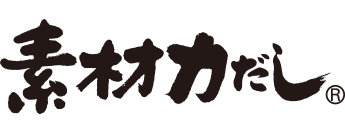
Solution business
Our business model is not only about selling products, but also proposing added value through our products. We drive our Solution Business with the twin engines of our Food and improving agent businesses. (Related topics: Presentation Center, Application & Innovation Center, Application Center)
T
Toiletries
These are everyday items used for grooming and personal hygiene. In general, they refer to soaps, shampoos, facial cleansers, sunscreen, lip cream, hand cream, and bath salts.
Our chemical improving agents are mainly made from plant sources. Highly regarded for being safe to use on human skin, they are being used in more and more toiletry products.
Traceability
The ability to trace a given food to its origin (back) and destination (forward) through records which are created and kept whenever the food is handled. At Riken Vitamin, we ensure the safety of our products by a system of integrated control from receiving of raw materials to shipping of product, which allows for traceability and quality checking at each of the following stages: Raw material; manufacturing; distribution; and sales.
Delivery of lectures concerning wakame (Riken Vitamin’s nutritional education)
We visit schools to give lessons on wakame to improve children’s health and dietary habits. We have lesson plans which enable children to have fun learning about the nutrition, ecology, and production sites relating to wakame, which is a familiar food item (used in wakame rice, etc.) on their school lunch menu.
V
Vitamin A
It is a fat-soluble vitamin. Carotene, which is found in abundance in green and yellow vegetables, is converted to vitamin A in the body. It works to maintain the health of skin and mucous membranes, and helps with nighttime vision.
Our founding business was the extraction of vitamin A from fish liver, and this is the origin of our company name. Our business builds on our industrial concentration technology of molecular distillation, as well as our know-how in extraction, refinement, and concentration that we gained through our vitamin A production.
Vitamin E (Tocopherol)
It is one of our key materials. It is a fat-soluble vitamin, also called tocopherol. In addition to nutritional fortification, we also develop its functionalities as an antioxidant to improve food stability. We also develop vitamin stabilization technologies to propose vitamin mixes to processed food manufacturers.
W
Wakame Soup
We launched this product in 1981 as an instant soup which can be enjoyed by simply adding hot water. It retains its popularity even today, as it responds to the health and convenience needs of customers.
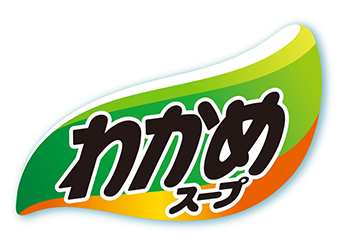
Wakame family
This is our mascot for seaweed products. Our mascot conveys the taste and health benefits of seaweed.
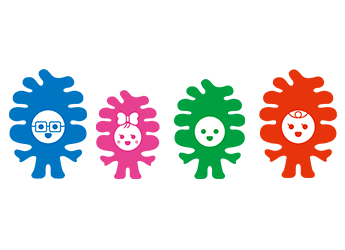
Y
Yuriage Factory
Our Group company Riken Food Co., Ltd., set up this factory in Natori City, Miyagi Prefecture, to process wakame and engage in production and R&D of wakame seedlings. In addition to reducing the workload of seaweed farmers, we select superior wakame varieties and supply farmers with seedlings to promote larger harvests and to work toward our future goal of having two growing seasons in a year.
It is part of Natori City’s Recovery Project for Fishery Joint Use Facilities aimed at rebuilding the Yuriage area and revitalizing the local fisheries.
